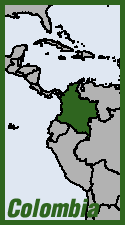 For 48 hours Feb. 21-2, hundreds of peasant coca-growers shut down the main highway between the southern Colombian cities of Tumaco and Pasto. The feared anti-riot force, the Mobile Anti-Disturbance Squadron (ESMAD), was finally called in to clear the roadway, using tear-gas and rubber bullets to break up the estimated 1,200 cocaleros. But the highway was repeatedly re-taken by the protesters. The action was called by the newly-formed National Coordinator of Coca, Opium and Marijuana Producers (COCCAM) to oppose the government's renewed "forced eradication" of coca crops in Tumaco municipality. COCCAM called the resumption of forced eradication in the area a betrayal of government commitments under the recent peace accords with the FARC guerilla movement, according to a report on Contagio Radio.
For 48 hours Feb. 21-2, hundreds of peasant coca-growers shut down the main highway between the southern Colombian cities of Tumaco and Pasto. The feared anti-riot force, the Mobile Anti-Disturbance Squadron (ESMAD), was finally called in to clear the roadway, using tear-gas and rubber bullets to break up the estimated 1,200 cocaleros. But the highway was repeatedly re-taken by the protesters. The action was called by the newly-formed National Coordinator of Coca, Opium and Marijuana Producers (COCCAM) to oppose the government's renewed "forced eradication" of coca crops in Tumaco municipality. COCCAM called the resumption of forced eradication in the area a betrayal of government commitments under the recent peace accords with the FARC guerilla movement, according to a report on Contagio Radio.
Ironically, Tumaco was chosen by the government and the FARC as a showcase for the new model of "voluntary eradication" under the peace accords' National Substitution Plan, notes newsweekly Semana. Under proposals pushed by the FARC, illicit crops such as coca and cannabis would not only be "substituted" with other crops, but the "illict uses" of such crops would also be substituted with licit ones—such as coca-based products and medical marijuana.
In the days leading up to the road blockade, COCCAM protested in statement after statement that the new eradication in Tumaco violated Point 4 of the Havana Accords with the FARC, on "Integral Rural Development."
COCCAM held its founding conference Jan. 27-28 in the southern colonial city of Popayán to press for the "use substitution" rather than "crop substitution" model in the new deal for Colombia's war-torn countryside. In a communique, the gathered cocaleros from throughout the country reminded President Juan Manuel Santos of his own words in describing the decades-long eradication effort as a "stationary bicycle," on which you work hard but don't get anywhere.
When the government and FARC signed the Havana Accords at a meeting in Bogotá in November, President Santos announced: "We have, for the first time, the opportunity to instate a structural solution to the problem of illicit crops."
Self-organized cocaleros are now putting this promise to the test. COCCAM leader César Jerez, speaking to Bogotá daily El Tiempo, took issue with the government estimate of 70.000 families across Colombia dependent on cultivation of illicit crops, putting the figure at a minimum of 250,000. "Somos campesinos, no guerrilleros ni narcotraficantes," he said. ("We are peasants, not guerillas or narco-traffickers.")
Cross-post to High Times







Recent comments
4 weeks 1 day ago
4 weeks 1 day ago
7 weeks 2 days ago
8 weeks 1 day ago
12 weeks 2 days ago
16 weeks 14 hours ago
20 weeks 19 hours ago
20 weeks 6 days ago
30 weeks 6 days ago
34 weeks 6 days ago